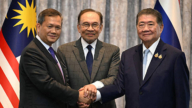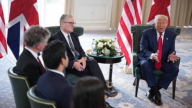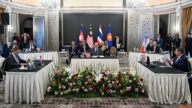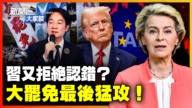【新唐人2011年11月21日讯】在美国的积极推动下,第六届东亚峰会终于不顾中共的反对,讨论了南中国海主权争端。美国总统奥巴马和中共总理温家宝在印尼闭门会谈时,再度就南中国海和人民币汇率问题展开了激烈的交锋。海外学者指出,随着美国重返亚太战略付诸实施,中美对抗进一步加剧。
奥巴马和温家宝11月18号首次短暂会晤后,19号再度会晤,奥巴马强调,美国在南中国海有很大的利益。白宫方面认为,南中国海问题的讨论是“建设性的”,奥巴马总统对此“感到鼓舞”。
《法新社》说,奥巴马不顾中国的反对,让本届东亚峰会成功讨论了南中国海争端问题,是奥巴马这次亚太之行的“外交胜利”。
中共《新华社》19号就温家宝与奥巴马会晤及南海问题,四度发出电讯稿,内容一次比一次强硬。
温家宝在东亚峰会上说:“关于南海问题,东亚峰会不是讨论这一问题的合适场合。本来不想谈论这个问题,但一些国家领导人点到中国,来而不往非礼也。”
他说,东亚和东南亚经济的发展,侧面印证了南海的航行自由和安全,没有因为南海争议受到任何影响,外部势力不应介入南海争议,而应由直接有关的国家协商和平解决。
纽约城市大学政治学教授夏明接受《新唐人》采访指出,美国重返亚太,除了跟它的传统盟国协调,同时又发展了新的一些势力,美国支持越南、菲律宾、印度挑战中国,南海成了亚太各方纷争的焦点。
夏明:“中美关系现在面临了一个新的转折点。美国它是加强了太平洋地区的努力和外交,那么,中国就很担心美国又在展开一场新的遏制战略,想包围中国,就使得中国不愿意示弱,所以中国对美国的压力反应就非常强烈。”
香港《明报》援引北京学者的分析认为,过去两周,美国推行跨太平洋战略经济伙伴关系协定、增兵亚太地区、与缅甸恢复关系,美国重返亚太的战略已从口号变成行动,中美关系将有大变化。
韩国《朝鲜日报》说,如果美国要深入亚洲,就必将与中国发生冲突。但美国似乎并不想躲避,反而摆出一副更积极的牵制和压迫中国的“强攻”架势。《华盛顿邮报》将此称之为“全方位打压中国”。
香港《动向》杂志主编张伟国也认为,南海争端有引发军事冲突的可能。
张伟国:“不管发生不发生,就看中国领导人自己能不能够务实的面对这样一些国际关系,面对这样一些国际矛盾,而不是把国内的、尤其是党内的这些政治斗争,来利用这样一种外交纷争作筹码,这种外交变成它内部斗争的一种筹码的时候,那战争爆发的可能性就更大。”
《朝鲜日报》援引分析说,美国突然“积极介入亚洲问题”,是因为意识到“今后美国经济复苏的关键在于亚洲”。
奥巴马刚刚在APEC峰会上就人民币升值问题向胡锦涛施压,又在印尼对温家宝表示,美国认为人民币的币值被大大压低了。
温家宝回应说,9月下旬到11月初,海外远期外汇市场出现人民币汇率的贬值预期。“这种情况不是人为决定的,是市场对人民币汇率的反映。”中方将增强人民币汇率双向浮动的弹性,暗示人民币会贬值。
夏明:“美国认为中国的人民币是人为的把它给降低了,所以人民币应该进行升值。但是,中国国内目前出现一个高度的通货膨胀,包括住房问题上,中国的物价已经超过了美国,所以在国内来看,人民币其实又在急剧的贬值。所以,中国出现这种双重压力。”
德国媒体分析认为,在南中国海这个对世界贸易如此重要的航路下面,海底蕴藏着巨大的石油和天然气资源。在欧洲和阿拉伯危机阴影下,在南中国海邻国之间形成的紧张,会很快转化为真正的冲突。
新唐人记者常春、李元翰、萧宇采访报导。
US-China Talks Lead to Growing Tensions
The United States questioned South China Sea’s sovereignty
during the Sixth East Asia Summit.
At the end of the meeting, U.S. President Barack Obama and
Chinese Premier Wen Jiabao conducted contentious talks in Indonesia,
again on the topic of the South China Sea and
the RMB exchange rate issue.
Overseas scholars pointed out that as the United States resumes
its Asia-Pacific strategy, Sino-U.S. confrontations are expected to intensify further.
Obama and Wen Jiabao met briefly on November 18.
On November 19, at their second meeting, Obama emphasized
that the United States has great interest in the South China Sea.
The White House believes that the discussion on
the South China Sea issue was “constructive," and that President Obama felt “encouraged."
Agence France-Presse reported that
despite Beijing’s opposition,
“Obama hailed the East Asia Summit as the top forum for
settling the region’s maritime territorial disputes with China.”
On November 19, the Communist regime’s mouthpiece,
Xinhua News Agency, reported four times, on the meeting between Obama and
Wen Jiabao as well as the South China Sea issue,
each time using progressively tough rhetoric.
Premier Wen Jiabao said during the East Asia Summit:
“Regarding the South China Sea issue,
the East Asia Summit is not an appropriate occasion
to discuss this issue. I did not want to talk about this issue.
However, since some leaders have pointed to China,
it would be impolite not to respond."
Wen said that the economic development of East and
Southeast Asia and the freedom of navigation and safety of
the South China Sea have not been affected by the dispute.
He mentioned that “external forces” should not interfere in
the South China Sea dispute and that things should be peacefully settled by the countries directly involved.
Political science professor, Ming Xia, of City University of
New York, agreed to be interviewed by NTD TV.
He indicated that regarding the renewed interests of the
United States in Asia-Pacific issues, which involves:
coordinating with its traditional allies, developing new forces
through the U.S. support of Vietnam, and the Philippines;
including India’s challenge to China—the South China Sea
has become the target in the Asia-Pacific dispute.
Xia: “Sino-U.S. relations are now facing a new
turning point.
The United States is strengthening its efforts and diplomacy
in the Pacific region, and thus China is very worried that
the United States is conducting a new containment strategy,
to encircle China.
Reluctant to show its weakness,
the Chinese reacted strongly to U.S. pressure."
Hong Kong’s Ming Pao Daily News quoted a
Beijing scholar’s analysis,
saying that the United States implemented the
Trans-Pacific Strategic Economic Partnership Agreement,
increased military presence in the region, and
restored relations with Myanmar.
The United States promise to return to the Asia-Pacific
has turned into action, thus the Sino-U.S. relations will undergo big changes.
South Korea’s newspapaer, Chosun Ilbo, said that
if the United States intends to go deep into Asia, a conflict with China is enevitable.
However, the United States doesn’t look like it it going about
things with the intention of avoiding a conflict with China.
Instead, it intends to openly and actively contain
China’s oppressive attacking posture.
Washington Post called it an “all-round pressure” for China.
Hong Kong Trends magazine editor, Zhang Weiguo,
also believes that the South China Sea dispute has raised the possibility of military conflict.
Zhang Weiguo: “Whether or not it happens, it all depends on
if the Chinese leaders themselves can pragmatically face such international conflicts and such international relations,
rather than trying to deal with international matters
with a domestic mind-set.
In particular, the political struggles within the party and
taking advantage of this diplomatic conflict and using it as a bargaining chip.
If China turns diplomacy and negotiation into
an internal struggle, the likelihood of war will be high."
Chosun Ilbo quoted analysts and stated that the United States
has suddenly gotten “actively involved in Asian issues"
because of its recent awareness of “the key to U.S. economic
recovery is in Asia."
Obama has just pressured President Hu Jintao at the APEC
summit on the appreciation of RMB,
then once again indicated to Wen Jiabao in Indonesia that the
United States believes the value of the RMB is being serverely depressed.
Wen responded that, in late September to early November,
the depreciation of the RMB exchange rate in the overseas foreign exchange markets is “not a human decision,
but rather a reflection of the market to the RMB exchange
rate," and that China will strengthen two-way floating RMB exchange rate flexibility,
suggesting that the RMB will face further depreciation.
Xia: “The United States believes China’s yuan is artificially
depreciated and thus appreciation of the RMB should take place.
However, China is currently experiencing high inflation,
including housing;
China’s market prices are higher than the United States,
so from a domestic point of view, the RMB has actually depreciated sharply.
Therefore, dual pressures have emerged in China."
German media analysts believe that the South China Sea is a
very important world trade route and underneath its waters contains tremendous resources of oil and gas.
Under the shadow of the crisis in Europe and the Arab nations,
the South China Sea tensions between the neighboring countries will soon be translated into real conflicts.
NTD reporters Chang Chun, Li Yuanhan and Xiao Yu






























